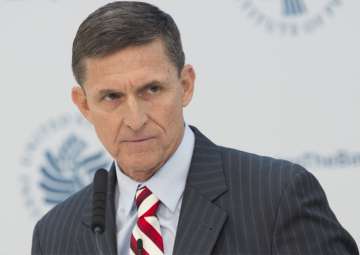President Donald Trump's former national security advisor Michael Flynn has been charged with making "false, fictitious and fraudulent" statements to the FBI over possible collusion between the Trump campaign and Russia during last year's US presidential polls.
Flynn, 58, a retired general, is scheduled to plead guilty to "willfully and knowingly" making before a court today, US media reported.
Flynn is the first Trump administration official and the fourth connected to the campaign to be charged as part of an investigation into possible collusion between the Russian government and members of Trump's team, as well as potential obstruction of justice and financial crimes.
Former Federal Bureau of Investigation (FBI) director Robert Mueller, who is investigating allegations of Russian interference in last year's US presidential elections as a Special Counsel, today announced that Flynn was charged with "wilfully and knowingly" making "false, fictitious and fraudulent statements" to the FBI about his conversations with Russia's then ambassador to the US Sergey Kislyak.
As per the charge sheet, Flynn lied when he told investigators that he did not ask Kislyak to "refrain from escalating the situation" in response to sanctions that then-president Barack Obama had imposed on Russia, and that he did not ask the ambassador to either delay or defeat a related UN Security Council vote.
The White House declined to immediately comment.
Trump's former campaign chairman Paul Manafort and his deputy Rick Gates were indicted last month; they pleaded not guilty. And Trump campaign foreign policy adviser George Papadopoulos pleaded guilty for making a false statement to the FBI over contacts with officials connected to the Russian government.
The charge against Flynn is the first in Mueller's probe that has reached someone in the Trump White House and is the latest sign that the special counsel's investigation is intensifying, CNN reported.
A key campaign adviser during President Trump's presidential campaign, Flynn was tapped as Trump's national security adviser in November 2016, a senior White House job that put him in a vital role for all of the administration's national security and foreign policy decisions.
But he resigned from the post soon after he misled Vice President Mike Pence and then-chief of staff Reince Priebus about his conversations with Kislyak in which they discussed US sanctions against Russia.
Latest World News

